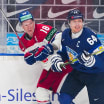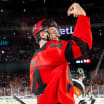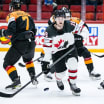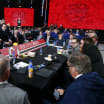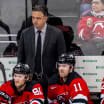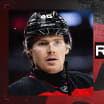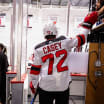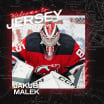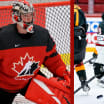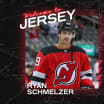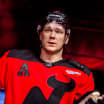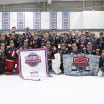Tom McVie had reason to be proud and to feel secure in his New Jersey surroundings.
He had directed the Devils into a playoff berth; a nifty plus.
Then, his skaters extended the sizzling Rangers to a seventh game of their opening playoff round.
The Devils were beaten by a better team; no doubt. But had McVie's goaltending been up to the Blueshirts standard, New Jersey might have pulled off the upset of upsets.
SUNDAYS WITH STAN: The Herbie Brooks Era Begins
Stan Fischler continues his Devils history storytelling with Herb Brooks' arrival in New Jersey with the franchise
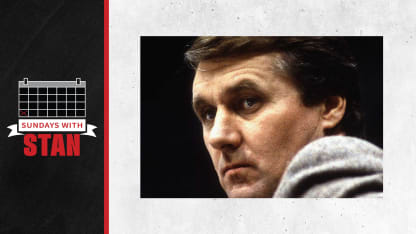
By
Stan Fischler
Special to NHL.com
Nobody had to tell that to The Boss, Lou Lamoriello. Sensitive to the changing winds of contemporary hockey, Lou decided to import Brooks as his club's new head coach.
Tommy McVie got the gate and a farewell back pat from Lamoriello.
"The coaching change should not be interpreted as an indictment of the job Tom McVie did for us," Lou insisted. "He served the Devils organization well for a long period of time.
"But, at present, with the type of talent our team possesses, we find that Herb Brooks is the man best suited to take our team to the top."
Good soldier that he was, McVie accepted the decision bravely and with customary class. Meanwhile, the coaching hero of the 1980 Olympics arrived in East Rutherford with suitable fuss and fanfare.
Herbie already had become a media favorite during his stint behind the Rangers bench; especially when his Blueshirts almost upset the defending Cup champion Islanders in a 1984 playoff classic.
"Brooks was up against a team that had won four consecutive Cups," said
Associated Press hockey writer Shelly Sakowitz. "and if his guys had beaten Billy Smith in OT of the deciding game, he'd have been a hero."
What Herbie could do -- or not accomplish -- with the Garden Staters remained to be seen. The Star-Ledger's headline suggested that there would be surprises galore.
BROOKS STILL RADICAL AFTER ALL THESE YEARS, the Star-Ledger proclaimed.
At the club's September 1992 training camp, Brooks offered few insights into his game plan and general modus operandi. That would come later. For the moment, he chose to be light-hearted.
When a reporter asked if planned to be "radical" in his approach to coaching innovation, the new coach shot back, "I never even burned my Draft card."
With Herb at the helm, his team was considered one of the most competitive in the Patrick Division one that featured parity across the board. Meanwhile, Lamoriello sought to bolster the club with more moves.
It took a while for Lou to find a trading partner but by mid-January, the Oilers were willing to take both Zdeno Ciger and Kevin Todd off the Devils roster and in return the Devils obtained crack center Bernie Nicholls.
Lamoriello: "Bernie gives us a dimension we didn't have. It's a dimension that makes us a better team, and he's a proven scorer."
The critics gave Lou a unanimous rave. Still in his prime, Nicholls mixed skill with a feisty game.
John Dellapina in The Record alluded to the number nine on Nicholls' uniform. "That number is for the nine different ways Bernie will help the club."
Writing in the New York Post, Hugh Delano noted, "Lou's 24th trade since he took over could be his best."
There was, however, an unexpected downer that tampered enthusiasm.
Unfortunately, Nicholls' infant son, Jake -- only two-months-old -- was hospitalized in a Long Beach, California hospital. As often as possible, Bernie would fly cross-country to be at Jake's bedside.
Meanwhile, under Brooks' baton, the Devils were less than overwhelming. Pittsburgh was the division-winner, followed by Washington and the Islanders.
Bringing up the rear, in fourth place, the Devils would face the top banana Penguins in the opening round.
The unenviable challenge moved Terry Egan in The Record to quip, "Looking ahead to playing the Penguins is like looking forward to paying taxes!"
The first test would be on April 18, 1992, and it went according to form. Pittsburgh won 6-3. Ditto for Games Two and Three. The scores were different but the sad fact was that the Devils were on the ropes.
But not out.
On Sunday afternoon, April 25, 1993, they proved that. Stephane Richer ignited the comeback by beating goalie Tom Barrasso on an early first-period power play.
Defenseman Tommy Albelin added another power-play goal in the second frame and yet another Penguins penalty was exploited by Claude Lemieux.
By this time Byrne Arena was virtually rocking off its foundations, especially when the final buzzer sounded and Brooks' stick handlers emerged with a 4-1 triumph.
"Hey, another win and we go back home again," was the message through the New Jersey clubhouse as the Visitors took the ice for Game Five.
For two periods the Devils were making good on their promise. They overcame a two-goal deficit and emerged from the second period with a 3-2 lead.
The question: Could Chris Terreri -- with some help from his friends -- hold the goaltending fort in the third period?
They did, through the five-minute mark until controversial referee Don (Donut) Koharski got into the act.
Pittsburgh rookie forward Martin Straka crashed the New Jersey zone and invaded Terreri's turf. According to the Devils goaltender, Straka then "stepped on my stick and fell down."
Koharski agreed with the second half of Terreri's point but not the first. The referee that New Jersey fans got to dislike from the 1988 playoffs called a minor penalty on the Visitors.
"It was a terrible call," insisted defenseman Scott Stevens.
Devils beat hockey writer Dellapina described it as "a phantom call."
Trouble was, there was no reversing the verdict and for 90 seconds the Devils penalty-killers kept the attackers at bay. But, ultimately, Ron Francis put a seeing-eye puck past Terreri and the game was tied.
Stevens: "That bad penalty changed the outcome of the game and gave them momentum. I still don't know what Kohaski saw out there."
Scott was right about the momentum change. The Penguins exploited the Devils letdown and poured through the defenses to take the lead on a Jeff Daniels goal and won the series on Daniels' follow-up open-netter.
Losing the series four games to one to the defending Stanley Cup champions was a bitter pill for Brooks to swallow.
The same could be said for Lamoriello and Lou's boss, owner Dr. John McMullen. After a careful review of the season -- and Herb's erratic handling of the club -- the high command made a painful decision.
Brooks was fired and a search began to find a successor for the 1993-94 campaign.
It would prove to be a monumental surprise -- and an enormous success!

